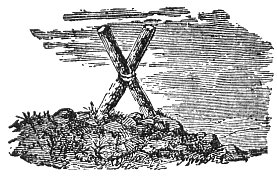p. 801
 A MIRACULOUS tradition, something like that connected with the labarum of Constantine, hallows the Ancient Cross of St. Andrew. Hungus, who in the ninth century reigned over the Picts in Scotland, is said to have seen in a vision, on the night before a battle, the Apostle Saint Andrew, who promised him the victory; and for an assured token thereof, he told him that there should appear over the Pictish host, in the air, such a fashioned cross as he had suffered upon. Hungus, awakened, looking up at the sky, saw the promised cross, as did all of both armies; and Hungus and the Picts, after rendering thanks to the Apostle for their victory, and making their offerings with humble devotion, vowed that from thenceforth, as well they as their posterity, in time of war, would wear a cross of St. Andrew for their badge and cognizance.
A MIRACULOUS tradition, something like that connected with the labarum of Constantine, hallows the Ancient Cross of St. Andrew. Hungus, who in the ninth century reigned over the Picts in Scotland, is said to have seen in a vision, on the night before a battle, the Apostle Saint Andrew, who promised him the victory; and for an assured token thereof, he told him that there should appear over the Pictish host, in the air, such a fashioned cross as he had suffered upon. Hungus, awakened, looking up at the sky, saw the promised cross, as did all of both armies; and Hungus and the Picts, after rendering thanks to the Apostle for their victory, and making their offerings with humble devotion, vowed that from thenceforth, as well they as their posterity, in time of war, would wear a cross of St. Andrew for their badge and cognizance.
John Leslie, Bishop of Ross, says that this cross appeared to Achaius, King of the Scots, and Hungus, King of the Picts, the night before the battle was fought betwixt them and Athelstane, King of England, as they were on their knees at prayer.
Every cross of Knighthood is a symbol of the nine qualities of a Knight of St. Andrew of Scotland; for every order of chivalry required of its votaries the same virtues and the same excellencies.
Humility, Patience, and Self-denial are the three essential qualities of a Knight of St. Andrew of Scotland. The Cross, sanctified by the blood of the holy ones who have died upon it; the
p. 802
[paragraph continues] Cross, which Jesus of Nazareth bore, fainting, along the streets of Jerusalem and up to Calvary, upon which He cried, “Not My will, O Father! but Thine be done,” is an unmistakable and eloquent symbol of these three virtues. He suffered upon it, because He consorted with and taught the poor and lowly, and found His disciples among the fishermen of Galilee and the despised publicans. His life was one of Humility, Patience, and Self-denial.
The Hospitallers and Templars took upon themselves vows of obedience, poverty, and chastity. The Lamb, which became the device of the Seal of the Order of the Poor Fellow Soldiery of the Temple of Solomon, conveyed the same lessons of humility and self-denial as the original device of two Knights riding a single horse. The Grand Commander warned every candidate not to be induced to enter the Order by a vain hope of enjoying earthly pomp and splendor. He told him that he would have to endure many things, sorely against his inclinations; and that he would be compelled to give up his own will, and submit entirely to that of his superiors.
The religious Houses of the Hospitallers, despoiled by Henry the Eighth’s worthy daughter, Elizabeth, because they would not take the oath to maintain her supremacy, had been Alms-houses, and Dispensaries, and Foundling-asyla, relieving the State of many orphan and outcast children, and ministering to their necessities, God’s ravens in the wilderness, bread and flesh in the morning, bread and flesh in the evening. They had been Inns to the wayfaring man, who heard from afar the sound of the Vesper-bell, inviting him to repose and devotion at once, and who might sing his matins with the Morning Star, and go on his way rejoicing. And the Knights were no less distinguished by bravery in battle, than by tenderness and zeal in their ministrations to the sick and dying.
The Knights of St. Andrew vowed to defend all orphans, maidens, and widows of good family, and wherever they heard of murderers, robbers, or masterful thieves who oppressed the people, to bring them to the laws, to the best of their power.
“If fortune fail you,” so ran the vows of Rouge-Croix, “in divers lands or countries wherever you go or ride that you find any gentleman of name and arms, which hath lost goods, in worship and Knighthood, in the King’s service, or in any other place of worship, and is fallen into poverty, you shall aid, and support,

Moe is the founder of GnosticWarrior.com. He is a father, husband, author, martial arts black belt, and an expert in Gnosticism, the occult, and esotericism.





